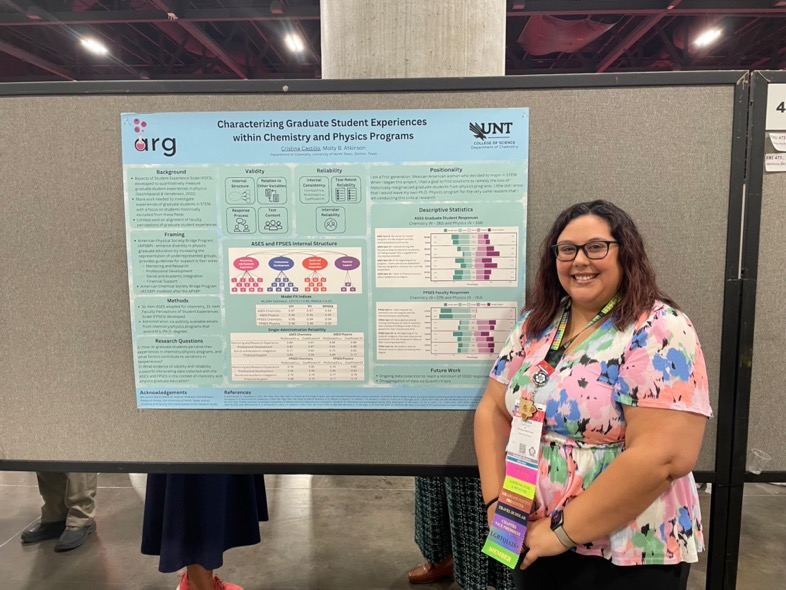Cristina Castillo is a UNT Chemistry doctoral student conducting chemistry education research (CER) under the mentorship of Dr. Molly Atkinson. Her research specifically focuses on the experiences of historically marginalized and underrepresented graduate students in STEM.
“My main project involves studying graduate student experiences in chemistry and physics programs across the nation,” said Cristina, who double majored in chemistry and physics at UNT as an undergrad and received her M.S. in physics here in 2021 before beginning her Ph.D. program. “While working on my master’s degree, I realized I loved teaching. I love helping students discover a passion for science and showing them that learning science is not as scary as they may think. When I learned about STEM education research, it felt like I was discovering my true calling.”

Education does indeed seem to be Cristina’s calling. During a teaching fellowship last summer with UNT Physics, she was excited to witness the positive impact that she had on students’ lives by implementing effective, evidence-based practices into her classroom. In the Spring of 2024, she received UNT Chemistry’s Best Teaching Assistant Award for the General Chemistry Laboratory.
Cristina also recently attended the annual SACNAS National Diversity in STEM (NDiSTEM) Conference on a travel scholarship from SACNAS that covered her registration, flight, and hotel to present her research. A travel award from the UNT College of Science helped fund the rest of her trip.
“I have attended several other national conferences, but nothing prepared me for this one.” Cristina said she discovered SACNAS in 2022 and joined the UNT Student Chapter last year. “The sense of community and culture was everywhere! Every attendee was just so happy to be there with other scientists who look like them.”
At the conference, Cristina presented the initial findings of her current research project, which is collecting data from graduate students using an instrument developed by Diana Sachmpazidi and Charles Henderson in 2021, the Aspects of Student Experiences Scale (ASES).
“Additionally, we developed and administered a corresponding instrument to measure how faculty perceive graduate student experiences, called the Faculty Perceptions of Student Experiences Scale (FPSES),” explained Cristina. “My poster included our initial data collected via these two instruments, as well as information related to the validity and reliability of data generated by the ASES and FPSES.”
The goal of this work is to uncover barriers to STEM graduate education for students, and to use the knowledge of these barriers to provide guidelines on how to most effectively implement relevant change in graduate policies at the department/college/university levels to increase diversity within these programs and STEM overall.
"Research on graduate education in STEM is a relatively new area. We are just now uncovering details on barriers for students with identities that have been underrepresented (and often largely excluded) from graduate education, specifically in chemistry and physics,” said Dr. Atkinson. “It is critical that we have scholars like Cristina conducting this research – scholars with shared experiences and the positionality to do this work and think critically about how to remove these barriers. I feel lucky as an advisor to have the opportunity to work with and learn with Cristina!”
As a first-generation student, Cristina said that she has appreciated the assistance UNT has provided through various scholarships, travel awards, and mentorship during her academic journey.
“My recommendation to other students is to apply for travel awards so that you can present your research and meet others at conferences; this has helped me in so many ways!” she said. “And NEVER think you aren’t good enough to be in your program. Imposter syndrome is a real thing and we all experience it…even professors!”